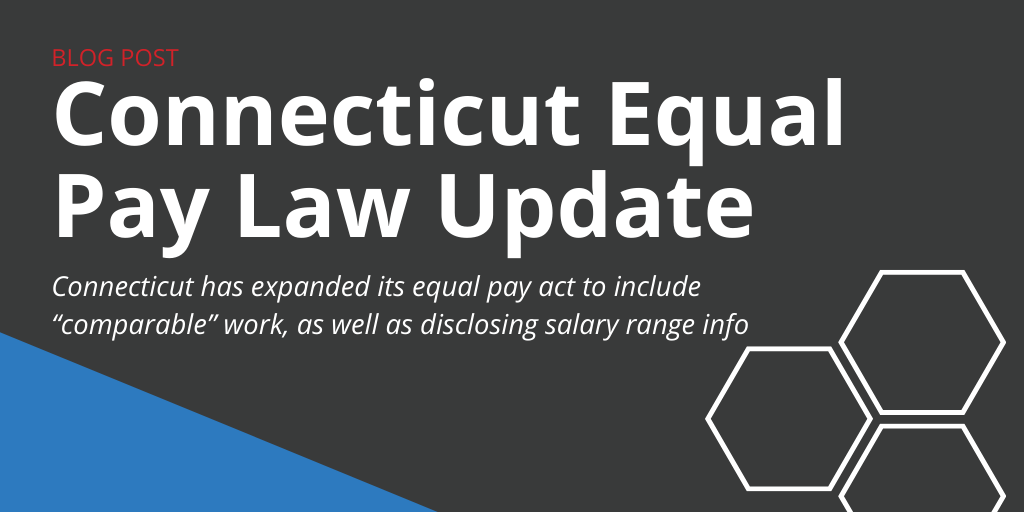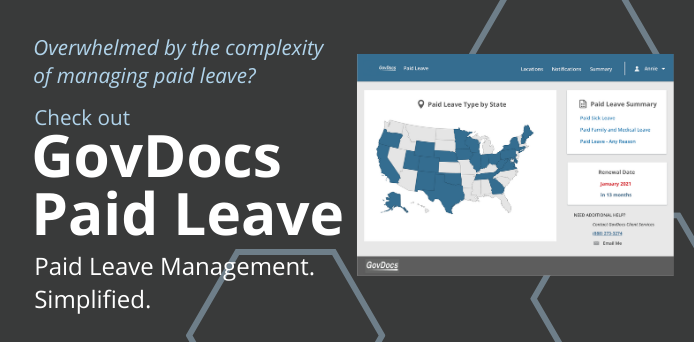EMPLOYMENT LAW NEWS
Connecticut Equal Pay Law Update
By Kris Janisch
Published July 15, 2021

The updates to Connecticut’s equal pay law go into effect Oct. 1 and apply to all employers in the state.
Connecticut’s equal pay law has been updated with two major compliance provisions for employers.
Broadly, the amended law:
- Bans pay differences between men and women for “comparable” work, as opposed to “equal”
- Requires employers to tell job applicants and employees the “wage range” for a position
The updates go into effect Oct. 1, 2021, and apply to all employers in Connecticut.
Connecticut’s Equal Pay Law
The first change to Connecticut’s equal pay law is fairly straightforward. Instead of “equal” work, employers must now consider the nature of similar jobs in order to pay the same rates for “comparable” positions. Those factors include skill, effort and responsibility, as well as working conditions.
To pay employees differently, employers must be able to demonstrate differences in:
- Seniority
- Merit
- Education
- Training
- Credential
- Skill
- Geographic location
- Experience
- Bona fide factor not tied to sex
Meanwhile, the other update requires employers to disclose to job applicants and existing employees the wage range for a job.
Starting Oct. 1, 2021, employers must provide job applicants with a wage range information at the applicant’s request or prior to or at the time an applicant is made an offer, whichever is sooner.
The law also says employers must provide wage range information for an employee’s job upon:
- The hiring of the employee
- A change in the employee’s position
- The employee’s first request for a wage range
Other states, including California, Maryland and Washington, already have similar measures in place.
Minimum Wage Management. Simplified.
Equal Pay Laws Across the U.S.
 Several equal pay laws have been enacted across the U.S. in recent years, with the #MeToo movement sparking some of the new legislation.
Several equal pay laws have been enacted across the U.S. in recent years, with the #MeToo movement sparking some of the new legislation.
Plus, some states have expanded these laws to include gender identity, ancestry, relationship status and more. Companies’ efforts to bolster diversity, equity and inclusion in the workplace have become hot topics in employment law of late, and pay equity laws are part of that equation.
Employers with locations in multiple jurisdictions should review state and local laws to maintain compliance.
Conclusion
With only a two and a half months until the amendments to Connecticut’s equal pay law go into effect, employers should review policies and procedures ahead of the Oct. 1 effective date.
That may include:
- Setting internal wage ranges
- Evaluating the responsibilities of employees within the organization
- Auditing employees’ pay levels
- Re-examining job postings
- Training hiring managers
As always, employers should review the specifics of the law and consult legal counsel if needed.
This Employment Law News blog is intended for market awareness only, it is not to be used for legal advice or counsel.
Keep Informed
with GovDocs Employment Law News
Learn More About GovDocs
What is GovDocs?
GovDocs simplifies employment law compliance for large, multi-jurisdiction employers in the U.S. and Canada. The GovDocs software platform integrates three solutions in one convenient place to help you master the employment laws impacting your business. Whether you manage a postings, minimum wage or paid leave program, our products cut through research time, provide proactive insights into the everchanging landscape of employment laws and reduce the risk of noncompliance. The company is headquartered in St. Paul, Minn.
Have fewer than 30 locations?
The GovDocs Poster Store simplifies posting compliance for employers with less than 30 locations across all industries, offering a variety of posting products to meet your labor law compliance needs.



